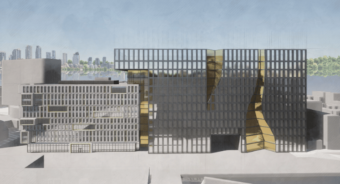By Steve Adams
A project that’s been described by developers as the most complex recent air rights project in Boston would bring a 300,000-square-foot life science tower to Back Bay along with 100 percent affordable housing and accessibility upgrades to the MBTA’s Hynes station.
Filling a gap along Boylston Street next to the Prudential Tunnel, Peebles Corp. proposes a 424,000-square-foot development including a pair of 10- and 12-story buildings on the Massachusetts Turnpike’s 1.2-acre parcel 13 at the corner of Massachusetts Avenue.
In a project notification form submitted to the Boston Planning and Development Agency, Miami Beach-based Peebles Corp. said the project “will incorporate time-tested, readily accepted urban design and building design principles to knit the project site back into the surrounding neighborhood.”
With a maximum height of 178 feet for the lab building, the proposal is 58 feet taller than the neighborhood’s base zoning, and neighbors have expressed concerns about shadow impacts upon Newbury Street residences.
Developers said they will use low-noise rooftop mechanical equipment and install noise-muffling enclosures or mechanical blankets on outdoor equipment that runs continuously.
The 125 housing units – which will rely partly on low-income tax credits to provide equity – will be located in a 106,000-square-foot building on the western side of the site. The unit mix will include 30 studios, 20 one-bedroom units, 64 two-bedroom units and 11 three-bedroom units.
MassDOT required developers to rebuild the Hynes station on the MBTA’s Green Line to comply with handicap accessibility laws. The designs include new entrances on Boylston Street, Massachusetts Avenue and Newbury Street, including replacement of the Boylston Street and 360 Newbury St. headhouses, a tunnel under Massachusetts Avenue, renovations to the station interior and platforms and replacement of MBTA electrical transformers.
Developers estimate the cost of the station upgrades at over $54 million.
The project was redesigned over the past year to reflect evolving resiliency requirements – including the need to elevate an electrical transformer to the ground floor – and to comply with Massachusetts procurement laws on the construction of the new MBTA station, developer R. Donahue Peebles said in a recent interview.
Developers hope to receive all approvals by early 2023, clearing the way for them to apply for public subsidies that will support the affordable housing component, and break ground in early 2024.
Developers propose converting a short stretch of Boylston Street between Massachusetts Avenue and Dalton Street to one-way eastbound, while creating a separate emergency vehicle lane for the nearby fire station and creating a separated bike lane.
A BPDA public comment period on the project runs through Oct. 12.
Credit: Banker & Tradesman


No comments.